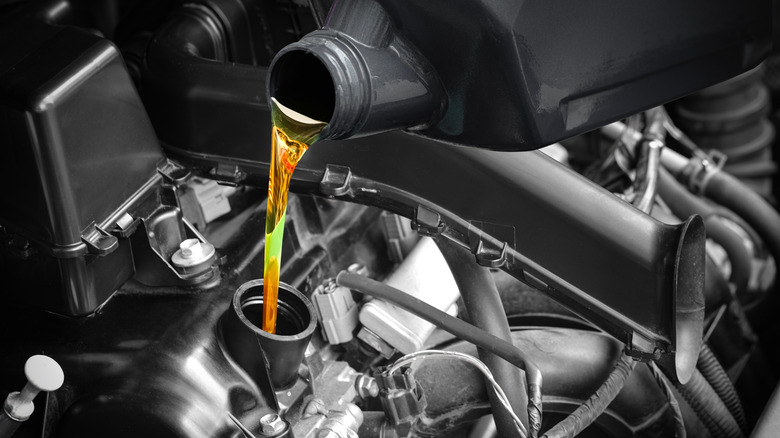What Is Oil Shearing And How Does It Affect Your Engine?
The engine oil coursing through your car is so much more than just a lubricant for its moving parts. Engine oil protects the components under the hood, helps dissipate heat, and works to keep your engine running smoother for longer. However, under extreme heat and mechanical stress, even the best oils can break down — especially through a process known as oil shearing.
In these harsh conditions, engine oil starts to break down on a mechanical level. This hits your engine especially hard around the piston rings, gears, and bearings. In these zones, the oil molecules are torn apart, causing the oil to get thinner. Once that happens, the oil isn't viscous enough to form a protective film around the engine components. This, in turn, leads to more friction, more wear, and more of a chance of overheating.
It happens all the time in modern engines, high-performance ones or otherwise. Engines today run hotter, spin faster, and operate under tighter spaces than in years past. Consider this along with turbocharged systems, direct injection, and the toll of stop-and-go traffic, it's not hard to understand why oil shearing is becoming a more and more common concern.
How oil shearing affects your engine
When oil shears and thins out, the protective film of oil between your engine parts begins breaking down. Without the right viscosity, you get more and more metal-on-metal contact (and that's a recipe for damaging the engine). As viscosity drops and friction increases, you might notice your engine feeling sluggish, your acceleration declining, and your fuel economy taking a turn for the worse.
When that degraded oil starts leaving behind harmful sludge and carbon deposits inside the engine, things start to get clogged. This problem makes it much harder for the engine to dissipate heat, and it can even cause oil to enter the combustion chamber and burn (raising emissions and dirtying the engine even further). This kind of breakdown can quickly snowball into catastrophic engine failure.
The risk isn't limited to high-performance vehicles. Everyday driving can cause the same shearing issues over time, especially in extreme heat, cold, or heavy traffic. Going too long between oil changes, driving too aggressively, and even using the wrong type of oil can make matters even worse. This is why oil specifications like HTHS (High Temperature High Shear) exist: Higher HTHS values mean that the oil is better at resisting shearing and maintaining its protective thickness, even under extreme conditions.
How to prevent oil shearing
Thankfully, oil shearing doesn't have to happen. Being proactive, keeping up with your regularly scheduled maintenance, and using the right oil can go a long way to keeping your engine oil nice and viscous. That said, even something like a high mileage oil will degrade with time and use. That's why regular oil changes in line with your manufacturer's recommendations are non-negotiable.
Many premium synthetic oils are specifically engineered to withstand mechanical stress without degrading. Shear-resistant additives also help. These include viscosity index improvers, anti-wear agents, and dispersants, all of which can help oils perform consistently across temperature swings and mechanical cycles.
Whether you drive the car for work or for fun, two of the most effective ways to protect your engine oil are to choose a shear-stable one and regularly change it when you're supposed to. Don't wait until performance drops or damage occurs. Stay ahead of oil shearing to avoid those expensive repairs.


